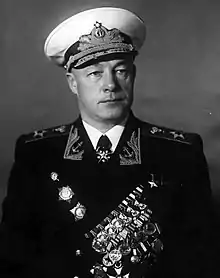Срби у Русији Srbi u Rusiji | |
|---|---|
 Flag of the Serbian minority in Russia | |
| Total population | |
| Regions with significant populations | |
| mainly Moscow, Stavropol Krai | |
| Languages | |
| Russian and Serbian | |
| Religion | |
| Eastern Orthodox Church | |
| Related ethnic groups | |
| Serbs in Ukraine |
There is a community of Serbs in Russia (Russian: Сербы в России; Serbian: Срби у Русији, romanized: Srbi u Rusiji), also known as Russian Serbs (Russian: Российские сербы; Serbian: Руски Срби, romanized: Ruski Srbi), which includes Russian citizens of ethnic Serb descent or Serbian-born people residing in the country.
History

Middle Ages
After the Ottoman invasion of Serbia in the 14th century, Serbian refugees found refuge in Russia.[3] Lazar the Serb (built the first mechanical public clock in Russia) and Pachomius the Serb (hagiographer and translator) were some of the notable Serbs in Russian medieval history.[4] Elena Glinskaya (1510–1538), the mother of Russian emperor Ivan the Terrible (r. 1547–84), was maternally Serbian.[5] The Orthodox worship of Saint Sava was established in Russia in the 16th century.[3]
Russian Empire
In the 1750s, in a re-settlement initiated by Austrian Colonel Ivan Horvat, a vast number of Orthodox Serbs, mostly from territories controlled by the Habsburg monarchy (the Serbian Grenzers), settled in Russia's military frontier region of New Serbia (with the centre in Novomirgorod, mainly in the territory of present-day Kirovohrad Oblast of Ukraine), as well as in Slavo-Serbia (now mainly the territory of the Luhansk Oblast of Ukraine). In 1764, both territorial entities were incorporated in Russia's Novorossiya Governorate. Serbs continued to settle in Russian lands, and many, such as Sava Vladislavich, Nikolay Depreradovich, and Peter Tekeli, became high ranking generals and imperial nobility.
During the Napoleonic Wars, many Russian generals were either Serbian-born or of Serbian descent, including Georgi Emmanuel, Peter Ivelich, Nikolay Vuich, Ivan Shevich, and multiple others. The most esteemed Serb in the service of the Russian Empire at the time of the Napoleonic Wars was Count Mikhail Miloradovich, a leading commander during the French invasion of Russia and governor-general of Saint Petersburg.
Soviet Union
Throughout the existence of the Soviet Union, many Serbs in Russia continued to play prominent roles in society. Notable figures at the time include Admiral of the Fleet and Hero of the Soviet Union Nikolai Kuznetsov and renowned sculptor and Hero of Socialist Labour Yevgeny Vuchetich, responsible for The Motherland Calls, which was the largest statue in the world at the time of its construction.
Notable people
 | 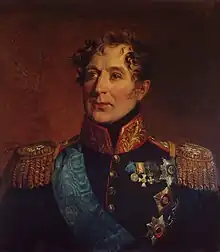 | 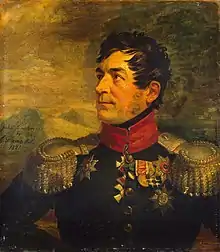 |  | 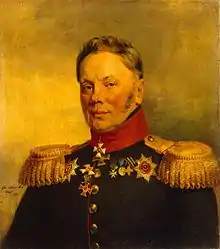 | 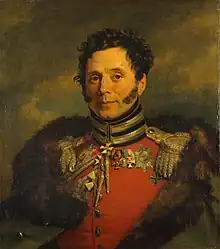 | 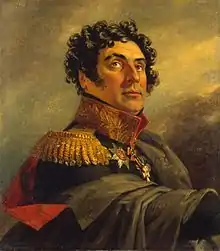 |  |  |
 |  |  |  | .jpg.webp) |  | _(14627032383).jpg.webp) |  |  |
Nobility and military personnel
- Ivan the Terrible, Tsar of All-Russia from 1547 to 1584.
- Elena Glinskaya, Grand Princess consort of Moscow and Regent of Russia in the 16th century
- Sava Vladislavich, Serbian diplomat, count, and merchant-adventurer in the employ of Peter the Great who conducted important diplomatic negotiations in Constantinople, Rome, and Beijing

- Dmitry Horvat, Imperial Russian lieutenant-general and great-grandson of Jovan Horvat, the founder of New Serbia in Imperial Russia
- Semyon Zorich, Imperial Russian lieutenant-general and count of the Holy Roman Empire
- Jovan Horvat founded New Serbia by the right bank of the Donets River between the Bakhmut and Luhan River.
- Rajko Depreradović one of the founders of Slavo-Serbia in the early 1750s
- Jovan Šević one of the founders of Slavo-Serbia
- Peter Tekeli, General-in-Chief of the Russian army
- Andrei Miloradovich, 18th century general and statesman
- Count Marko Ivelich, 18th and early 19th century general
- Count Mikhail Miloradovich, a general prominent during the Napoleonic Wars, best known for defeating Joachim Murat.
- Ivan Shevich, general in the Napoleonic Wars
- Count Georgi Emmanuel, general of the Napoleonic Wars
- Ivan Adamovich, general of the Napoleonic Wars
- Nikolay Bogdanov, general of the Napoleonic Wars
- Peter Mikhailovich Kaptzevich, general of the Napoleonic Wars
- Baron Ilya Duka, general who fought in the Napoleonic Wars
- Nikolay Depreradovich, general of the Napoleonic Wars
- Peter Ivelich, general of the Napoleonic Wars
- Nikolay Vuich, general of the Napoleonic Wars
- Ivan Yankovich, general of the Napoleonic Wars
- Jeremija Gagić, diplomat in the service of the Russian Empire, ennobled by Nicholas I
- Dejan Subotić, a Serbo-Russian military and state leader
- Nikolai Dimitrievich Dabić, Vice-admiral of the Russian Imperial Navy, died in 1908 from wounds sustained in the Russo-Japanese War
- Marko Vojnović, Admiral of the Russian Imperial Navy, one of the founders of the Black Sea Fleet
- Jovan Albanez, commander of the Serbian Hussar Regiment.
- Anto Gvozdenović, Russian commander and ambassador.
- Simeon Piščević, Austrian and Russian general major.
- Mikhail Mirkovich, military general and ethnographer
- Nazary Alexandrovich Karazin, an Imperial Russian officer, came from a family of Greek and Serbian origin.
- Vasily Karazin later worked on educational reforms and founded The Ministry of National Education in Russian Empire. He is also the founder of Kharkiv University.
- Alexander Knyazhevich, Finance Minister of Imperial Russia, 1858–1862
- Dmitry Knyazhevich, soldier and Olympic fencer
- Nikolay Gerasimovich Kuznetsov, Admiral of the fleet of the Soviet Union
- Natalia Poklonskaya, Deputy of the State Duma of the Russian Federation
Clergy
- John of Shanghai and San Francisco, Eastern Orthodox ascetic and hierarch of the Russian Orthodox Church Outside Russia
- John of Tobolsk, Metropolitan of Tobolsk, who became a saint
- Nikodim Milaš, Bishop of Dalmatia and expert in canon law who studied at the Kyivan Theological Academy, among other institutions of learning.
- Lazar the Serb, one of the earliest inventors of clocks.
- Pachomius the Serb, Serbian and Russian hagiographer.
- Simeon Končarević Orthodox bishop
Sportspeople
- Aleksandra Krunić, professional tennis player
- Vesna Dolonc, professional tennis player

- Dmitry Knyazhevich, Olympic fencer and military general
Admirals
Other
- Andrej Dudrovich, Russian philosopher, professor and Rector of Kharkiv University.
- Aleksej Jelačić, Russian-born Serbian historian.
- Stefano Zannowich, Writer and adventurer, a contemporary of Casanova.
- Atanasije Stojković, Serbian writer and one of the first professors at Kharkiv University. He is considered the founder of the Russian meteoritics.
- Miloš Marić, biologist and head of the department of histology at Saratov State University. Brother of Mileva Marić.
- Teodor Filipović, Serbian writer and one of the first professors at Kharkiv University.
- Gligorije Trlajić, Serbian writer, poet, polyglot and professor of law at the universities of St. Petersburg and Kharkiv
- Teodor Janković-Mirijevski, educational reformer
- Yevgeny Vuchetich, a prominent Soviet sculptor and artist, known for his heroic monuments.
- Ognjeslav Kostović Stepanović, Serbian inventor who also lived in Russia.
- Dositej Obradović, Serbian writer and philosopher who resided in Imperial Russia for a short period in the second half of the 18th century.
- Milla Jovovich, Hollywood actress
- Đorđe Lobačev (1909-2002), Russian and Serbian comic strip author and illustrator
See also
| Part of a series on |
| Serbs |
|---|
 |
References
- ↑ Информационные материалы об окончательных итогах Всероссийской переписи населения 2010 года
- ↑ Официальные статистические данные Статистические сведения в отношении иностранных граждан, находящихся на территории Российской Федерации Сведения в отношении иностранных граждан, находящихся на территории Российской Федерации, в половозрастном разрезе (по состоянию на 4 марта 2015 г.)
- 1 2 Predrag R. Dragić Kijuk (1999). Hilandar: 1198-1998. Association of writers of Serbia. p. 163.
- ↑ Davidović 2003, p. 25
- ↑ Robert Payne; Nikita Romanoff (2002). Ivan the Terrible. Rowman & Littlefield. p. 436. ISBN 978-0-8154-1229-8.
Sources
- Atnagulov, R.E.I., 2017. Demographic characteristics of the Serbs in Russia. Nasleđe, Kragujevac, 14(37-1), pp. 27–31.
- Branković, Zoran (1995). Srbi u Ruskoj Imperiji. Dunaj. ISBN 9788682465034.
- Davidović, Blagoje (2003). Srbi u istoriji Rusije. Narodna knjiga–Alfa. ISBN 978-8633108119.
- Kostić, Mita; Lalić, Sredoje; Gavrilović, Slavko (2001). Nova Srbija i Slavenosrbija. Srpsko-ukrajinsko društvo. ISBN 978-86-902499-1-6.

